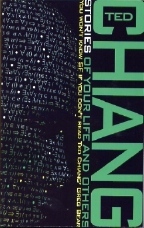 |
 Ted Chiang
Ted Chiang
Stories of Your Life and Others
Reviewed by: Stephanie Cage © 2005
Tor UK / Pan Macmillan
UK Mass Market Paperback
0-330-42664-8
333 Pages; £6.99
Date Reviewed: 20th April 2005
Orb Books / Tor / Tom Doherty Associates
US Trade Paperback
0-765-30419-8
336 Pages; $14.95
Date Reviewed: 20th April 2005
Index:
Science Fiction
Fantasy
Horror
General Fiction
China Miéville has described Ted Chiang’s stories as true ‘literature of ideas’, and rightly so. Several of the tales in ‘Stories of Your Life and Others’ take as their starting points some of the most extraordinary premises of contemporary fiction: What if the tower of Babylon were real? What if angels habitually appeared on earth? What if the written word had the power to animate lifeless objects?
Beside these, others of the collection look positively mundane. What if our system of mathematics was found to be flawed? What if drugs were available that could enhance human brainpower beyond what is currently imaginable? What if a new class of humans — ‘metahumans’ — developed new fields of scientific endeavour, unintelligible to us normal beings? Yet each of these premises also results in an original and thought-provoking piece of writing.
Chiang’s stories deal with the extraordinary, but their grounding in everyday details makes even the most bizarre occurrences seem perfectly believable. In ‘Understand’, for example, the central character first learns about his new drug-induced abilities when he finds that he remembers the six-digit numbers used weeks earlier by the doctor to test for short-term memory loss. This strikes him as odd: he’s not someone who habitually remembers numbers. In fact, he keeps all his phone numbers on auto-dial. It is moments like this that convince us that despite all the evidence to the contrary, we are dealing here with ordinary human beings like ourselves, in a world not so fundamentally different from our own.
That, to me, is what makes Chiang’s stories so unusual. While they are in many ways intellectual exercises, the thought-experiments are brought vividly to life through the characters who people his worlds. The best example of this is perhaps the title piece, ‘Story of Your Life’, where the conceit of an alien race whose concept of time differs radically from our own is represented through the experience of the human linguist assigned to study their language and behaviour. We follow her through a collage of moments from her past, present and future, gradually coming to know a cast of lightly sketched but very believable characters including her husband and the daughter to whom the story is addressed. In the hands of a less skilled writer, the complicated timeline would seem clumsy and the second-person narration gauche, but Chiang’s economical style is more than equal to the challenge.
'Story of Your Life' is not the only story that uses an unconventional format to make its point. In ‘Liking What You See: A Documentary’, the documentary structure allows Chiang to weave a variety of points of view through the story, so that we are forced to make our own judgement based on a multiplicity of arguments and accounts, much as the characters themselves do. Through the medium of their debate on the merits of calliagnosia (an induced condition which prevents the sufferer — or beneficiary — judging others on their looks), Chiang introduces some fascinating questions. Alongside the age-old question of whether beauty is only skin-deep, he addresses the more topical issue of whether, and how, we should attempt to combat prejudice. Is there ever such a thing as a level playing field?
These are big questions to tackle in the confined format of a short story, although perhaps not as ambitious as those explored in the two religious stories: ‘Tower of Babylon’ and ‘Hell is the Absence of God’. ‘Tower of Babylon’ asks whether we’ve got the moral of the Babel fable wrong, and questions how we go about understanding the world. ‘Hell is the Absence of God’ is a moving evocation of grief as well as an intriguing speculation on how our world would change if religious beliefs such as angels, Heaven, Hell and the judgement day were literal realities.
Like most of the book’s premises, these ideas would easily sustain a longer story, perhaps even a novel, but there is no sense of incompleteness about these short pieces. Chiang is expert at implying a world beyond the boundaries of his story, while keeping the story itself tightly contained and neatly concluded. Although, like many readers, I’d be curious to see what Chiang could do with a broader canvas, I won’t be holding my breath for his first novel. Perfect miniatures like these stories are much rarer than well-written novels, and I’ll be looking out for more such treasures.
|
 |
